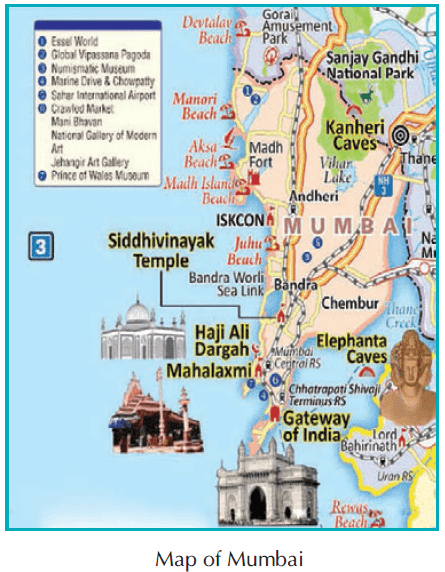Mumbai Class 3 Notes SST
Mumbai is the capital of Maharashtra. It is also called the financial capital of India. It was built by British. It is a very busy city. It has been the largest textile industry centre and has many other industries but somehow it is more known for Hindi film industry. This is called Bollywood as opposed to Hollywood of the USA.
People from all over the country come here to seek jobs, work and settle down. That is why it has the largest slum, jhuggi-jhopari settlements in the country. Mumbai faces too much civic pressure on this count.
Almost all Indian languages are spoken over here but English, Marathi and Hindi dominate others. Mumbai has developed its own dialect which has words from Hindi, Marathi and its own way of speech.
It is a very important harbour. Most of the land on which the township stands has been claimed from the sea.

As Kolkata is known for Durga Puja, Mumbai is known for Ganesh Chaturthi.
The snacks, Bhelpuri and Barapao are most popular in Mumbai, though now these are available all over the country.
Climate of Mumbai is hot and humid for most part of the year. It has very mild winter. It gets very heavy rain during the monsoon.
Things to Remember
- Mumbai is the capital of Maharashtra
- Mumbai is also called the financial capital of India
- It has many industries but it is more known for Hindi film industry
- Most of the Mumbai land has been claimed from the sea
- Mumbai is known for the religious festival, Ganesh Chaturthi
|
15 videos|153 docs|22 tests
|
FAQs on Mumbai Class 3 Notes SST
| 1. What is the Mumbai Class 3 exam? |  |
| 2. How can I register for the Mumbai Class 3 exam? |  |
| 3. What subjects are covered in the Mumbai Class 3 exam? |  |
| 4. Are there any preparation materials available for the Mumbai Class 3 exam? |  |
| 5. What is the duration of the Mumbai Class 3 exam? |  |





















